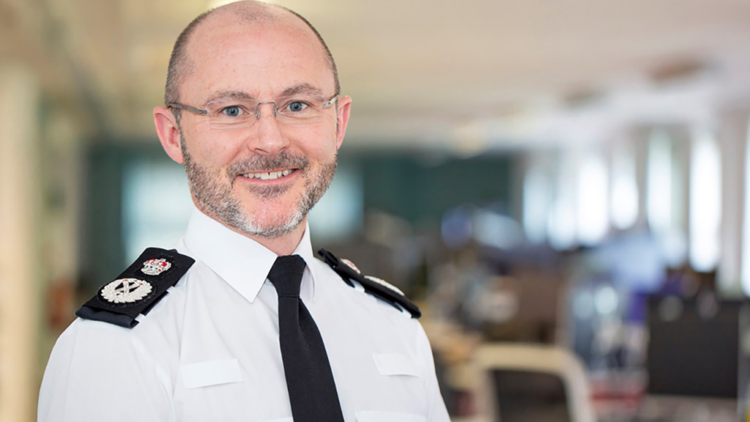By James Simons-
Police chiefs have accused the home secretary is interfering with their operational independence by demanding forces pursue all reasonable crime leads at a time when their resources are being outstripped by a rise in offences.
The chair of the National Police Chiefs’ Council (NPCC) said police chiefs insisted on having “operational independence” when deciding how best to respond to crime.
Chief Constable Gavin Stephens(pictured) was responding to the announcement from Home Secretary Suella Braverman that police must pursue all “reasonable lines of inquiry” to solve more crimes. National Police Chiefs’ Council (NPCC) raised serious doubts about the initiative by Suella Braverman used to launch the government’s crime week with insistence that there was “no such thing as minor crime”.
Braverman instructed forces to follow all evidence such as footage from CCTV, doorbells and dashcams, as well as phone data, to find a suspect or stolen property.
The NPCC responded to the plan in an open letter to Braverman, which pointedly began: “For decades, police forces have had a duty to pursue all reasonable leads of an alleged crime.”
The Home Secretary said it was “unacceptable” that crimes such as phone and car thefts, shoplifting and criminal damage are seen as less important.
Minister for Crime and Policing Chris Philp added there is no such thing as a “minor crime” and all merit proper investigation where there are leads to follow.
In an open letter to Ms Braverman and Mr Philp, Mr Stephens said: “Police forces have had a duty to follow all reasonable lines of inquiry for decades.
“However, growing demand as well as the increasing and changing nature of crime means consistency across forces varies. It is therefore right that police chiefs have operational independence and are responsible for making difficult decisions around how best to respond to the breadth of priorities of local communities.
“All chief constables have to make difficult decisions on resourcing and competing priorities. Protecting victims and delivering justice for them will always be at the heart of those decisions.”
Mr Stephens said while there has been a 2.6 per cent increase in police officer numbers nationally since 2010, the number of crimes reported to the police has increased 25 per cent.
Approximately 21 of 43 forces still have less officers than in 2010, he said.
Mr Stephens said neighbourhood policing is the “bedrock” and a vital part of how police can prevent crime and protect our communities.
“We believe that the number of neighbourhood officers should be increased,” he said, with better opportunities for continued professional development.
Mr Stephens also highlighted how the “complexity of crime” has increased in recent years and new emerging technology has provided police with additional leads that have greatly assisted investigations by using video images from doorbells, CCTV and dashcam footage.
“We are also continuously learning, including from publicly available 999 performance data to improve the speed at which emergency calls are answered so we can deliver the fastest possible response,” he added.
In the letter, he urges closer working on wider criminal justice reforms, of which policing is just one part, and calls for a long-term plan to go beyond the focus on officers and bolster essential and specialist police staff roles
“We recognize effective policing requires action not just words,” said Mr Stephens.
He highlighted some “great successes” over the past six to 12 months, which includes £130 million of cannabis and arresting 1,000 people, as part of the largest ever crackdown on cannabis farms and the organized gangs behind them.
Transforming the way police investigate rape and sexual offences, leading to charge rates and referrals to prosecutors increasing.
An example can be seen in Avon and Somerset Constabulary, where one of the pathfinder forces, the volume of cases charged has more than tripled.
Tackling gangs using a new tactic called ‘Clear, Hold, Build,’ where police officers ruthlessly pursue gang members until they are gone from an area, before working closely with the community to stop the gangs re-emerging;
Removing almost 10,000 knives from the street and arresting almost 1,700 people as part of the national Operation Sceptre.
Arresting around 2,000 protestors who have disrupted day-to-day life of communities; and
Working with the NHS to ensure the right agency attends mental health callouts to provide better care.
“If fully supported by new health services, this could mean up to one million hours redirected to fighting crime on our streets,” said Mr Stephens.
Policing is working hard to fight crime and do better for victims, he said, adding: “Victims are at the heart of what we do in policing. Protecting victims and delivering justice for them is why so many hard-working officers, staff and volunteers dedicate their lives to policing.
“Delivering a trusted, effective, and accessible police service is the shared ambition of everyone in policing. It is what we expect, and it is what victims and the public deserve.
“We welcome closer working with government and the criminal justice system to help achieve this.”




